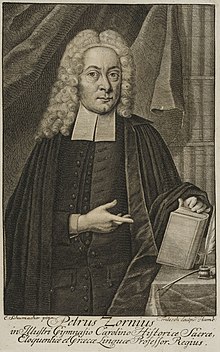Peter anger

Peter Zorn (also Petrus Zorn ; born May 22, 1682 in Hamburg , † January 23, 1746 in Berlin ) was a German Lutheran theologian, historian, Graecist and Hebrew. He also used the pseudonym Theophilus Amelii.
Zorn studied in Leipzig and Wittenberg. In the winter semester of 1705/06 he enrolled at the University of Rostock as a graduate, where he passed an exam and a disputation at the theological faculty. He gave lectures on Greek language and history in Giessen and Kiel. In 1715 he became rector at the grammar school in Plön. From 1720 he was a private scholar in Hamburg. In 1725 he became a professor of history and eloquence in Stettin. From 1739 he was rector at the grammar school in Thorn and there city librarian. Most recently he lived as a private scholar in Berlin.
Zorn was regarded as a versatile educated scholar who dealt in numerous books with church history, the history of antiquity and theology, but also, for example, with Jewish history and numismatics. He was considered contentious.
Works
- Dissertatio historico-theologica inauguralis de επικληςει veterum ad Spiritum S. in S. coena , Rostock 1705
- Bibliotheca Antiquaria et Exegetica in Universam Scripturam , Frankfurt 1724, 2 volumes
- Historia Fisci judaici sub imperio veterum Romanorum , Altona 1734
- Historica bibliorum ex Ebraeorum diebus festis et jejuniis illustr. , Leipzig 1741
- Historia bibliorum pictorum ex antiquitatibus Ebr. et Christ. illustrata , Leipzig 1743
- Historia bibliorum manualium , 1738
- Historia eucharistiae infantium , Berlin 1736
- Opuscula sacra , Altona 1731
- M. Petri Zornii Thorough explanation that the Lutheran truth some reformers have overcome so far that even against their will ... they have to give good testimony to the same truth, and that they are therefore connected to the Lutheran religion: In addition to two Kurtzen Bedencken, whose 1. It is about the Georgii Polii Exorcismo and the 2nd by Samuelis Strimesii void remarks about the most noble Colloquia, to explain the Autoris Historiæ Colloquiorum. Hamburg: Christian Liebezeit , 1705.
- The long-demanded Historia, of the Colloqviorum held between the Lutheran and Reformed theologians, in which the Lutheran Church is partly freed from the false accusations of today's Reformers ...; partly the futile hope / to create a union through Colloqvia / is shown thoroughly ...: including the attached reminder of the Reformed teaching / how the same corresponds in many ways with papismo, fanaticismo and socinismo Hamburg: Liebezeit, 1705.
- Petri Zornii Tractatus de libertatibus ecclesiae Gallicanae antiquae et hodiernae… Ex praelectionibus academicis, in quibus Galliam schismaticam, exhibuit. Acc. Appendix in qua autor se defendit… (Stricturae ad) nuperrimas Joh. Fabricii Rostochii: Wepplingius, [approx. 1705]
- To the Magnifico Venerable and Well-Venerable, Well-Worn and Well-Worn Gentlemen ... Johanni Cypriano, ... Joh. Alberto Fabricio, ... Justo Corthum, ... Wishes the inexhaustible treasure of God's grace [Sl], [1704]
- Dissertatio Historico-Theologica De Catacombis Seu Cryptis Sepulchralibus SS. Martyrum, In Qua Burnetti, Missonii Et Aliorum Sententia Defenditur Contra Mabillonium, Ciampinum, Bosium Et Alios Romanenses Lipsiæ: Brandenburger, 1703.
- Theoph. Amelii Discussion of the darkest and most difficult passages in the Old Testament Cologne: Peter Marteau 1705 ff., Also in 2 volumes, Leipzig, Frankfurt 1728
- Dissertatio de Atheniensium sarcasmo, in S. Paulum spermologon, e lectionibus antiquitatum Romanarum [et] Graecarum Kilonii: Reuther, 1710.
Remarks
- ↑ Biographical data according to Samuel Baur New historical, biographical-literary concise dictionary from the creation of the world to the end of the eighteenth century , Volume 5, Ulm 1810, pp. 974f.
- ↑ Entry in the Rostock matriculation portal , WS 1705/06, No. 14
- ^ Entry in the Rostocker matriculation portal , Dean's book, Theol. Fac., WS 1705/06, No. 1
- ^ In Ludwig Wachler's history of historical research and art since the restoration of literary culture in Europe , Volume 2, Göttingen 1816, p. 100, it is stated that he was Rector in Altona during his time in Hamburg
- ^ According to Heinz Schulz-Falkenthal, Joachim-Friedrich Schulze, Maria Blumentritt Sklaverei in der Greco-Roman Antiquity , University and State Library Saxony-Anhalt 1985, p. 156, he was professor at the grammar school in Stettin from 1725 and in Hamburg from 1731
- ↑ Samuel Baur , loc. cit., describes him as an exegete and archaeologist, but of a very violent temperament
| personal data | |
|---|---|
| SURNAME | Anger, Peter |
| ALTERNATIVE NAMES | Zornius, Peter; Pezron, Justus; Anger, Peter; Amelius, Theophilus (pseudonym); Critopulus, Nicetas (pseudonym); Johannes Lotharius Maria (pseudonym); Johannes Lotharius Maria a Cruce (pseudonym) |
| BRIEF DESCRIPTION | Librarian, philologist, professor of theology in Kiel, church historian |
| DATE OF BIRTH | May 22, 1682 |
| PLACE OF BIRTH | Hamburg |
| DATE OF DEATH | January 23, 1746 |
| Place of death | Berlin |